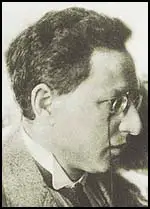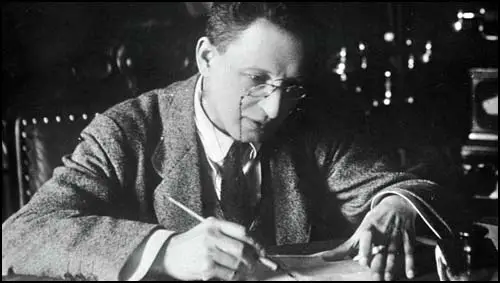Moisei Uritsky

Moisei Uritsky, the son of Jewish parents, was born in Cherkasy, in the Ukraine on 14th January 1873. He studied law at Kiev University and graduated in 1897. As a student he joined the Social Democratic Party.
In 1901 he was arrested and sent to prison. A fellow prisoner, Anatoly Lunacharsky, later wrote: "In those days he (Uritsky) wore a large black beard and sucked perpetually at a small pipe. Phlegmatic, imperturbable as a sea-going bo’sun, he strode about the prison with his characteristic bear-like gait. He knew everything, found his way everywhere, impressed everybody and was kind to some, harsh to others, his authority challenged by none. He dominated the prison staff by his calm strength and put his moral superiority to powerful and effective use."
At the Second Congress of the Social Democratic Party in London in 1903, there was a dispute between Lenin and Julius Martov, two of the party's main leaders. Lenin argued for a small party of professional revolutionaries with a large fringe of non-party sympathizers and supporters. Martov disagreed believing it was better to have a large party of activists. Martov won the vote 28-23 but Lenin was unwilling to accept the result and formed a faction known as the Bolsheviks.
Those who remained loyal to Martov became known as Mensheviks. Uritsky, like George Plekhanov, Pavel Axelrod, Leon Trotsky, Lev Deich, Vladimir Antonov-Ovseenko, Irakli Tsereteli, Andrei Vyshinsky, Noi Zhordania and Fedor Dan supported Julius Martov.
During the 1905 Revolution Uritsky joined Leon Trotsky in establishing the St. Petersburg Soviet. Over the next few weeks over 50 of these soviets were formed all over Russia. With the failings of the Duma, the Soviets were seen as the legitimate workers' government. In December, 1905, the St. Petersburg Soviet was crushed and Uritsky was arrested and imprisoned. Uritsky was sentenced to internal exile in Siberia.

On the outbreak of the First World War he emigrated to France and later lived in Copenhagen. During this period he spent his time writing articles for socialist newspapers. After the overthrow of Nicholas II, the new prime minister, Prince Georgi Lvov, allowed all political prisoners to return to their homes. Uritsky arrived back in St. Petersburg and joined the Bolsheviks and was appointed to the Military Revolutionary Committee.
Anatoly Lunacharsky later pointed out: "By no means everyone is aware of the truly gigantic role played in Petrograd by the Military Revolutionary Committee, beginning on about the 20th October and lasting until the middle of November. The culmination of this superhuman organizational effort were the days and nights from the 24th to the end of the month. Throughout those days and nights Moisei Uritsky never slept. Round him was a handful of men of great strength and stamina, but they became exhausted, were relieved, took turns at the work: Uritsky, his eyes red with lack of sleep, but as calm and smiling as ever, stayed at his post in the armchair where all the threads met and whence were issued all the directives of that makeshift, crude but mighty revolutionary organization." According to John Reed , after the November Revolution he assisted Leon Trotsky on developing foreign policy.
In March, 1918, Uritsky joined the Communist Secret Police (Cheka) and was appointed Commissar for Internal Affairs in the Northern Region. He was assassinated by Leonid Kannegisser, a young military cadet, on 17th August, 1918. Lunacharsky commented: "They killed him. They struck us a truly well-aimed blow. They picked out one of the most gifted and powerful of their enemies, one of the most gifted and powerful champions of the working class."
Leon Trotsky argued in My Life: An Attempt at an Autobiography (1930): "The Socialist-Revolutionaries had killed Volodarsky and Uritzky, had wounded Lenin seriously, and had made two attempts to blow up my train. We could not treat this lightly. Although we did not regard it from the idealistic point of view of our enemies, we appreciated the role of the individual in history. We could not close our eyes to the danger that threatened the revolution if we were to allow our enemies to shoot down, one by one, the whole leading group of our party."
The Bolsheviks newspaper, Krasnaya Gazeta , reported on 1st September, 1918: "We will turn our hearts into steel, which we will temper in the fire of suffering and the blood of fighters for freedom. We will make our hearts cruel, hard, and immovable, so that no mercy will enter them, and so that they will not quiver at the sight of a sea of enemy blood. We will let loose the floodgates of that sea. Without mercy, without sparing, we will kill our enemies in scores of hundreds. Let them be thousands; let them drown themselves in their own blood. For the blood of Lenin and Uritsky, Zinovief and Volodarski, let there be floods of the blood of the bourgeois - more blood, as much as possible." Uritsky's death therefore was partly responsible for what became known as the Red Terror.
Primary Sources
(1) Anatoly Lunacharsky, Revolutionary Silhouettes (1923)
When we had looked around a little we realized that this was rather a special prison: the cell doors were never locked, exercise was taken communally and during exercise we sometimes played games, sometimes attended lectures on scientific socialism. At night we all sat at the windows and the singing and recitations would begin. The prison was run as a Commune, so that both the prison rations and the parcels sent by our families all went into the common pot. The Commune of political prisoners was allowed to go shopping in the market, for which we pooled our resources; we also ran the kitchen, which was fully staffed by the criminal inmates. The criminals regarded the Commune with adoration, as it was ultimately the reason why the prisoners were not beaten-up or even sworn at.
What miracle had turned the Lukyanovsky detainees into a Commune? It was because the prison was run less by its governor than by the senior ‘political’ – Moisei Solomonovich Uritsky.
In those days he wore a large black beard and sucked perpetually at a small pipe. Phlegmatic, imperturbable as a sea-going bo’sun, he strode about the prison with his characteristic bear-like gait. He knew everything, found his way everywhere, impressed everybody and was kind to some, harsh to others, his authority challenged by none.
He dominated the prison staff by his calm strength and put his moral superiority to powerful and effective use.
Years passed in which we were both exiled, both became émigrés.
Moisei Solomonovich Uritsky, a Left Menshevik, was a sincere and ardent revolutionary and a socialist. Beneath his apparent coldness and phlegm there was concealed a titanic faith in the cause of the working class.
He made fun of all those eloquent speeches full of pathos about the great and beautiful; he was proud of being level-headed and was fond of making play with it, even to the point of apparent cynicism, but in fact he was an idealist of the purest water. For him, life outside the workers’ movement did not exist. His enormous political passion did not seethe or bubble – simply because it was methodically and systematically directed to one end. He therefore expressed it only in action – highly effective action.
His logic was inflexible. The 1914 war set him on the course of internationalism and he sought no middle way. Like Trotsky, like Chicherin, like Joffe, he soon realized the utter impossibility of maintaining even the shadow of a link with the Menshevik Defencists and he therefore broke radically with the Martov group, who could not understand why he did so.
Even before the war, along with the man who stood politically closest to him, L.D. Trotsky, he was closer to the Bolsheviks than to the Mensheviks.
After a long separation I met him again in Berlin in 1913. The same story happened again! I have always been unlucky when lecturing. The Russian colony in Berlin invited me to give two lectures, but the Berlin police arrested me, held me in prison for a short spell and expelled me from Prussia without right of re-entry. Again Uritsky appeared like a good genie. He not only spoke excellent German but had connections everywhere which he set in motion to convert my arrest into a major scandal for the government. Once more I admired how, smiling ironically, he would talk to a detective or to bourgeois journalists and how he described our campaign at a consultation with Karl Liebknecht, who had also taken an interest in this minor but significant incident.
(2) Bolshevik newspaper, Krasnaya Gazeta, announcing the start of the Red Terror on 1st September, 1918.
We will turn our hearts into steel, which we will temper in the fire of suffering and the blood of fighters for freedom. We will make our hearts cruel, hard, and immovable, so that no mercy will enter them, and so that they will not quiver at the sight of a sea of enemy blood. We will let loose the floodgates of that sea. Without mercy, without sparing, we will kill our enemies in scores of hundreds. Let them be thousands; let them drown themselves in their own blood. For the blood of Lenin and Uritsky, Zinovief and Volodarski, let there be floods of the blood of the bourgeois - more blood, as much as possible.
